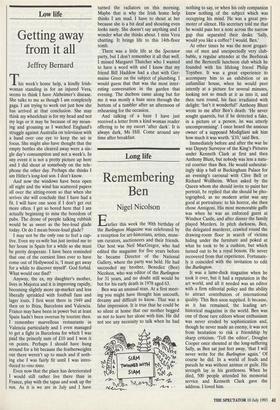Long life
Remembering Ben
Nigel Nicolson
Earlier this week the 90th birthday of the Burlington Magazine was celebrated by a reception for art-historians, artists, muse- um curators, auctioneers and their friends. Our host was Neil MacGregor, who had edited the magazine for five years before he became Director of the National Gallery, where the party was held. He had succeeded my brother, Benedict (Ben) Nicolson, who was editor of the Burlington for 31 years, and no doubt still would be but for his early death in 1978 aged 63.
Ben was an unusual man. At a first meet- ing you might have thought him uncouth, dreamy and difficult to know. That was a false impression. It is true that he could be so silent at home that our mother begged us not to leave her alone with him. He did not see any necessity to talk when he had nothing to say, or when his only companion knew nothing of the subject which was occupying his mind. He was a great pro- moter of silence. His secretary told me that he would pass her a note across the narrow gap that separated their desks: 'Sally, would you like a coffee? I would. Ben.'
At other times he was the most gregari- ous of men and unexpectedly very club- bable, a regular attender at the Beefsteak and the Bertorelli luncheon club which he founded with his lifelong friend Philip Toynbee. It was a great experience to accompany him to an exhibition or an unfamiliar house, when he would peer intently at a picture for several minutes, looking not so much at it as into it, and then turn round, his face irradiated with delight: 'Isn't it wonderful!' Anthony Blunt wrote to me after Ben's death: 'He never sought quarrels, but if he detected a fake, in a picture or a person, he was utterly uncompromising'. I once heard the anxious owner of a supposed Modigliani ask him how much it was worth. 110,' said Ben.
Immediately before and after the war he was Deputy Surveyor of the King's Pictures under Kenneth Clark at first and then Anthony Blunt, but nobody was less a natu- ral courtier than Ben. He would unhesitat- ingly skip a ball at Buckingham Palace for an evening's carousal with Clive Bell or Richard Wollheim. When asked by the Queen whom she should invite to paint her portrait, he replied that she should be pho- tographed, as no modern artist was any good at portraiture: to his horror, she then chose Annigoni. His most memorable gaffe was when he was an enforced guest at Windsor Castle, and after dinner the family played Murders. In pitch darkness, Ben, the delegated murderer, crawled round the drawing-room floor in search of victims hiding under the furniture and poked at what he took to be a cushion, but which turned out to be a royal bosom. He never recovered from that experience. Fortunate- ly it coincided with the invitation to edit the Burlington.
It was a lame-duck magazine when he took it over, but it had a reputation in the art world, and all it needed was an editor with a firm editorial policy and the ability to attract contributors of international quality. This Ben soon supplied. It became, as it has remained, the leading art- historical magazine in the world. Ben was one of those rare editors whose enthusiasm was never eroded by sophistication and, though he never made an enemy, it was not from hesitation to risk a friendship by sharp criticism. 'Tell the editor', Douglas Cooper once shouted at the long-suffering Sally, as Ben sat just feet away, 'that I will never write for the Burlington again.' Of course he did. In a world of feuds and pseuds he was without animus or guile. His strength lay in his gentleness. When he died, 500 people attended his memorial service and Kenneth Clark gave the address. I loved him.


















































 Previous page
Previous page